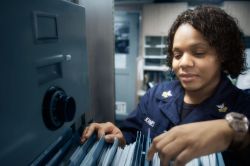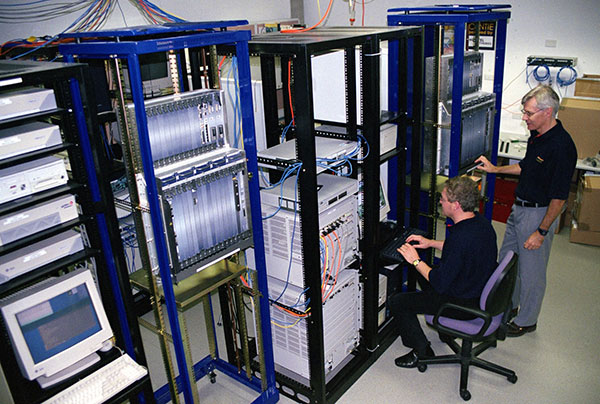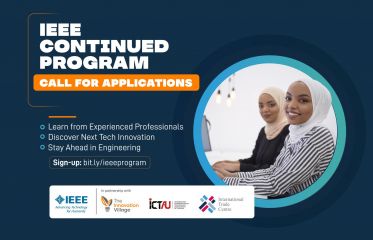
I am a

student

institution

career professional
I need help with
Career Selection & Planning
Find your best-fit career, stream, course or college through advanced assessments and expert guidance.
college applications
Get admits from your dream colleges through end-to-end applications guidance for overseas and liberal arts universities.
I am interested in
Career Development Programs
State-of-the-art career assessments, expert guidance, and more to help students plan their career paths.
Career Advancement Programs
Expert-led MUN training programs, inspirational career talks and more to help students get that added edge.
I am interested in
Getting Certified (ICCC)
Become an International Certified Career Coach through a multi-level credentialing program by Mindler & CDA (USA).
Partnering with Mindler
Expand and grow your career counselling practice by leveraging the full force of Mindler’s career guidance platform.
Ready to discover your perfect career?
Enter your email id to take the Orientation Style test for free.
CAREER COUNSELLING PROGRAMS
Class 8-9
Stream & Subject SelectionAdvanced assessment & personalised guidance to help you select the perfect stream and subjects that align you to the right careers.
Class 10-12
Career Selection & PlanningExpert guidance & 5-dimensional assessment to help you discover your perfect career and choose the right course and college.
Graduates
Career Selection & Development5-dimensional assessment & superior guidance to help you discover your perfect career and choose the best next step.
Thank you for contacting us!
One of our team members will respond in 2 working days to resolve your query. If your query is urgent, you can alternatively call our career helpline.
Ready to pave your way to your dream college?
Leave your details below and we will get in touch shortly.
COLLEGE APPLICATION PROGRAMS
Overseas Application
End-to-end overseas admissions guidance to help you build the perfect applications for your target universities.
Liberal Arts Application
Comprehensive guidance and personalised application development for admissions to Liberal Arts programs.
Thank you for contacting us!
One of our team members will respond in 2 working days to resolve your query. If your query is urgent, you can alternatively call our career helpline.
Ready to give students the best of career guidance?
Leave your details below and we will get in touch shortly.
Career Development Programs
Career Development &
Planning Ecosystem
State-of-the-art assessment & end-to-end career guidance to help students discover their perfect career.
Thank you for contacting us!
One of our team members will respond in 2 working days to resolve your query. If your query is urgent, you can alternatively call our career helpline.
Ready to give your students the added edge?
Leave your details below and we will get in touch shortly.
Career Advancement Programs
MUN Training Program
Expert-led training and comprehensive guidance sessions to help students excel at MUN conferences.
Mindler Talks
Career awareness and inspirational talks for students with professionals who have achieved success in their fields.
Thank you for contacting us!
One of our team members will respond in 2 working days to resolve your query. If your query is urgent, you can alternatively call our career helpline.
Ready to upgrade your career counselling skills?
Enter your email id to start your ICCC application.
Getting Certified (ICCC)
International Certified
Career Coach (ICCC)
A 3-month program with emphasis on global practices, experiential learning & career guidance tools.
Thank you for contacting us!
One of our team members will respond in 2 working days to resolve your query. If your query is urgent, you can alternatively call our career helpline.
Ready to grow as a counsellor?
Leave your details below and we will get in touch shortly.
Partnering with Mindler
Mindler Partner Program
World-class career assessment platform & tools to help you scale up your career counselling practice.
Thank you for contacting us!
One of our team members will respond in 2 working days to resolve your query. If your query is urgent, you can alternatively call our career helpline.
Breaking News
- Flexible Remote Work Opportunity for University Students: Earn $100–$250 Per Month ...Read More
- Ministry of Education and Sports Azerbaijan Government Scholarships For 2025-2026 Academic Year ...Read More
- Government Sponsorship Undergraduate Admission Lists 2025-26 for Makerere University ...Read More
- Ministry of Education And Sports: Egyptian Government Scholarships 2025-2026 Academic Year ...Read More
- Ground Breaker Full Scholarship for girls to study Software Engineering 2025 July Intake ...Read More
- Tony Elumelu Foundation Entrepreneurship Programme (TEEP) 2025 for young African Entrepreneurs ...Read More
- DESIGNING FUTURES 2050 International Design Competition 2025 (€15,000 prize) ...Read More
- Ground Breaker Full time Scholarship for girls to study Software Engineering 2025 Intake ...Read More
- Ministry of Education And Sports Algerian Vocational Training Scholarships for 2024-2025 AY ...Read More
- Ministry of Education and Sports Advert for the Algerian Government Scholarships for 2024-2025 ...Read More
Telecommunications Engineering Specialist
Design or configure voice, video, and data communications systems. Supervise installation and post-installation service and maintenance.
Add to FavouritesDesign or configure voice, video, and data communications systems. Supervise installation and post-installation service and maintenance.
Also known as: Corrosion Control Engineer, Mathematical Engineer, Optical Engineer, Ordnance Engineer, Photonics Engineer, Salvage Engineer
Daily Activities / Routine Tasks
Telecommunications Engineering Specialists do the following
1. Communicate with telecommunications vendors to obtain pricing and technical specifications for available hardware, software, or services.
2. Keep abreast of changes in industry practices and emerging telecommunications technology by reviewing current literature, talking with colleagues, participating in educational programs, attending meetings or workshops, or participating in professional organizations or conferences.
3. Implement or perform preventive maintenance, backup, or recovery procedures.
4. Consult with users, administrators, and engineers to identify business and technical requirements for proposed system modifications or technology purchases.
5. Assess existing facilities' needs for new or modified telecommunications systems.
6. Order or maintain inventory of telecommunications equipment for customer premises equipment (CPE), facilities, access networks, or backbone networks.
7. Install, or coordinate installation of, new or modified hardware, software, or programming modules of telecommunications systems.
8. Develop, maintain, or implement telecommunications disaster recovery plans to ensure business continuity.
9. Test and evaluate hardware and software to determine efficiency, reliability, or compatibility with existing systems.
10. Prepare purchase requisitions for computer hardware and software, networking and telecommunications equipment, test equipment, cabling, or tools.
11. Provide user support by diagnosing network and device problems and implementing technical or procedural solutions.
Key Knowledge Areas
To be a great Telecommunications Engineering Specialist, below are the key knowledge areas
Telecommunications — Knowledge of transmission, broadcasting, switching, control, and operation of telecommunications systems.
Computers and Electronics — Knowledge of circuit boards, processors, chips, electronic equipment, and computer hardware and software, including applications and programming.
English Language — Knowledge of the structure and content of the English language including the meaning and spelling of words, rules of composition, and grammar.
Administration and Management — Knowledge of business and management principles involved in strategic planning, resource allocation, human resources modeling, leadership technique, production methods, and coordination of people and resources.
Engineering and Technology — Knowledge of the practical application of engineering science and technology. This includes applying principles, techniques, procedures, and equipment to the design and production of various goods and services.
Mathematics — Knowledge of arithmetic, algebra, geometry, calculus, statistics, and their applications.
Design — Knowledge of design techniques, tools, and principles involved in production of precision technical plans, blueprints, drawings, and models.
Clerical — Knowledge of administrative and clerical procedures and systems such as word processing, managing files and records, stenography and transcription, designing forms, and other office procedures and terminology.
Skills / Important Qualities
To be a great Telecommunications Engineering Specialist, these skills are vital
Active Listening — Giving full attention to what other people are saying, taking time to understand the points being made, asking questions as appropriate, and not interrupting at inappropriate times.
Critical Thinking — Using logic and reasoning to identify the strengths and weaknesses of alternative solutions, conclusions or approaches to problems.
Complex Problem Solving — Identifying complex problems and reviewing related information to develop and evaluate options and implement solutions.
Systems Evaluation — Identifying measures or indicators of system performance and the actions needed to improve or correct performance, relative to the goals of the system.
Systems Analysis — Determining how a system should work and how changes in conditions, operations, and the environment will affect outcomes.
Judgment and Decision Making — Considering the relative costs and benefits of potential actions to choose the most appropriate one.
Monitoring — Monitoring/Assessing performance of yourself, other individuals, or organizations to make improvements or take corrective action.
-
 Flexible Remote Work Opportunity for University Students: Earn $100–$250 Per Month
Partime Income For Students
Flexible Remote Work Opportunity for University Students: Earn $100–$250 Per Month
Partime Income For Students
Know more -
 Ground Breaker Full Scholarship for girls to study Software Engineering 2025 July Intake
Full Scholarship
Ground Breaker Full Scholarship for girls to study Software Engineering 2025 July Intake
Full Scholarship
Know more -
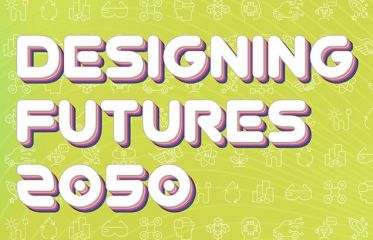 DESIGNING FUTURES 2050 International Design Competition 2025 (€15,000 prize)
SDG Design Competition
DESIGNING FUTURES 2050 International Design Competition 2025 (€15,000 prize)
SDG Design Competition
Know more -
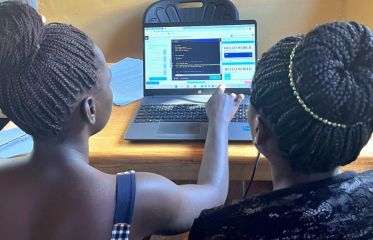 Ground Breaker Full time Scholarship for girls to study Software Engineering 2025 Intake
Full Scholarship for girls aged 18-25 years
Ground Breaker Full time Scholarship for girls to study Software Engineering 2025 Intake
Full Scholarship for girls aged 18-25 years
Know more -
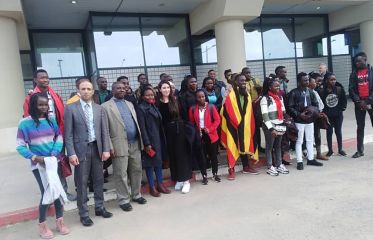 Ministry of Education And Sports Algerian Vocational Training Scholarships for 2024-2025 AY
Scholarship to study in Algeria
Ministry of Education And Sports Algerian Vocational Training Scholarships for 2024-2025 AY
Scholarship to study in Algeria
Know more -
 Uganda Dev Summit 2024 Live Stream
The UG DevSummit is a platform to fuel collaboration by connecting with the brightest minds in Ugandan tech,
Uganda Dev Summit 2024 Live Stream
The UG DevSummit is a platform to fuel collaboration by connecting with the brightest minds in Ugandan tech,
Know more -
 2024 Call for Code Global Challenge Win 50,000 USD
How can generative AI technology improve equitable access to essential resources and opportunities for all people?
2024 Call for Code Global Challenge Win 50,000 USD
How can generative AI technology improve equitable access to essential resources and opportunities for all people?
Know more -
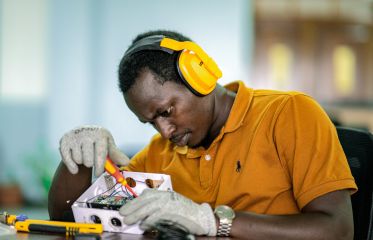 Sunbird AI Student Internship Program
A 3 months program where students at university or research institutes can spend 3 months working with Sunbird AI
Sunbird AI Student Internship Program
A 3 months program where students at university or research institutes can spend 3 months working with Sunbird AI
Know more -
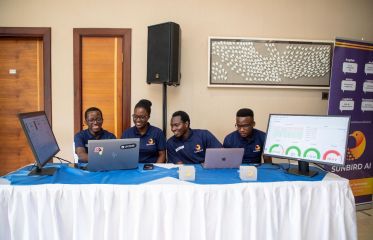 Sunbird AI Fellows Program
A 6 months program where program participants work together with Sunbird AI
Sunbird AI Fellows Program
A 6 months program where program participants work together with Sunbird AI
Know more -
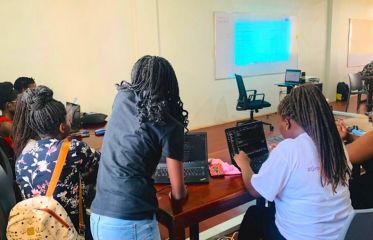 Ground Breaker Full time Scholarship for girls to study Software Engineering
Full Scholarship for girls aged 18-25 years
Ground Breaker Full time Scholarship for girls to study Software Engineering
Full Scholarship for girls aged 18-25 years
Know more -
 AU Digital and Innovation Fellowship - Cohort 2
A 12 Months Program targeting tech innovators in Africa
AU Digital and Innovation Fellowship - Cohort 2
A 12 Months Program targeting tech innovators in Africa
Know more -
 Apply to Women Institute of Technology and Innovation for 2024 Intake (Fully Funded)
Advance your IT Career with quality training from WITI
Apply to Women Institute of Technology and Innovation for 2024 Intake (Fully Funded)
Advance your IT Career with quality training from WITI
Know more -
 Cyber Security Training at Milima Cyber Academy (January 2024 Intake)
Sign up for the January 2024 intake
Cyber Security Training at Milima Cyber Academy (January 2024 Intake)
Sign up for the January 2024 intake
Know more -
 The Student Hub Introduces Coding and Graphics Design Program for Senior 6 Vacists (Cohort 3)
Career Mentorship Program for Senior 6 Leavers
The Student Hub Introduces Coding and Graphics Design Program for Senior 6 Vacists (Cohort 3)
Career Mentorship Program for Senior 6 Leavers
Know more -
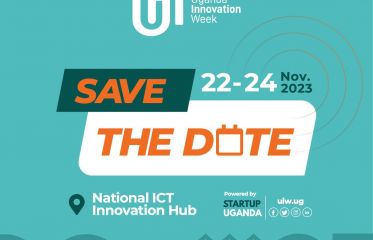 Uganda Innovation Week 2023 Live Stream - Adapt or be left behind
Full Stream of the Uganda Innovation Week 2023
Uganda Innovation Week 2023 Live Stream - Adapt or be left behind
Full Stream of the Uganda Innovation Week 2023
Know more -
 Post Bank Graduate Trainee Programme is back
Attractive Job Package, Inspiring Projects and Opportunity to make a difference
Post Bank Graduate Trainee Programme is back
Attractive Job Package, Inspiring Projects and Opportunity to make a difference
Know more -
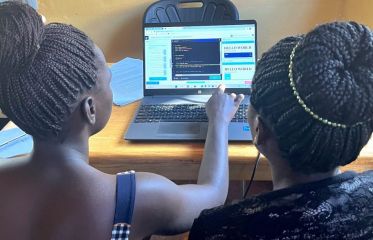 Ground Breaker Full time Scholarship to study Software Engineering
Full Scholarship for girls aged 18-25 years
Ground Breaker Full time Scholarship to study Software Engineering
Full Scholarship for girls aged 18-25 years
Know more -
 Full Scholarship for girls to study coding at the AchiraChix Campus in Kenya
Technical Training Program for girls interested in Software Engineering
Full Scholarship for girls to study coding at the AchiraChix Campus in Kenya
Technical Training Program for girls interested in Software Engineering
Know more -
Mobile Money Hackathon 2023 (Win 10,000 USD in prizes) Innovative financial and transactional applications
Know more -
 Sunbird AI Fellows Program
Opportunity to work on real world practical AI Projects
Sunbird AI Fellows Program
Opportunity to work on real world practical AI Projects
Know more -
 Google Artificial Intelligence (AI) First Accelerator Program for African Start Ups
A 10-week equity-free accelerator program for Seed to Series A startups based in Africa or developing Africa-centered solutions.
Google Artificial Intelligence (AI) First Accelerator Program for African Start Ups
A 10-week equity-free accelerator program for Seed to Series A startups based in Africa or developing Africa-centered solutions.
Know more -
 Full Scholarship to study Artificial Intelligence & Machine Learning Course at Refactory
Hone your AI & Machine Learning Skills
Full Scholarship to study Artificial Intelligence & Machine Learning Course at Refactory
Hone your AI & Machine Learning Skills
Know more -
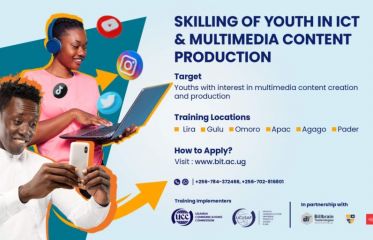 Free ICT & Multimedia Skills Training in Lira, Gulu, Apac, Omoro, Agago, Pader Districts
Hone your ICT Skills
Free ICT & Multimedia Skills Training in Lira, Gulu, Apac, Omoro, Agago, Pader Districts
Hone your ICT Skills
Know more -
 Apply for the I4GMasterClass Scholarship
Learn from the best in the world
Apply for the I4GMasterClass Scholarship
Learn from the best in the world
Know more -
 SheTech The Future, a program for female founders to grow their businesses
Join a community of female founders and grow your venture to the next level
SheTech The Future, a program for female founders to grow their businesses
Join a community of female founders and grow your venture to the next level
Know more -
 Full Scholarship to study Software Engineering at Africa Leadership University Under ALX Program
Join Africa's leading software engineering programme and develop skill sets fit for a global career.
Full Scholarship to study Software Engineering at Africa Leadership University Under ALX Program
Join Africa's leading software engineering programme and develop skill sets fit for a global career.
Know more -
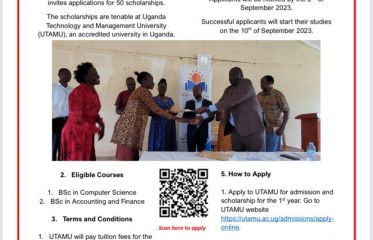 Call for Application for TEF-UTAMU Scholarships for Sept Intake
The Scholarships are tenable at Uganda Technology and Management University (UTAMU)
Call for Application for TEF-UTAMU Scholarships for Sept Intake
The Scholarships are tenable at Uganda Technology and Management University (UTAMU)
Know more -
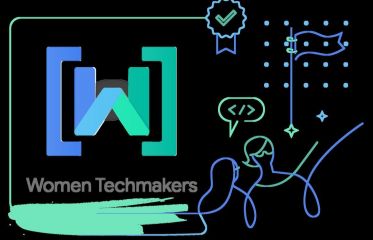 Google Women Techmakers Ambassadors Program 2023 for women in Technology
The Women Techmakers Ambassador program supports women in technology who are looking to create impact and give back to their communities
Google Women Techmakers Ambassadors Program 2023 for women in Technology
The Women Techmakers Ambassador program supports women in technology who are looking to create impact and give back to their communities
Know more -
1000 Women in Data Scholarship 2023 Free training to hone your skills as a Data Scientist
Know more -
 Women in Cyber Mentorship Programme 2023
Become a changemaker in cybersecurity
Women in Cyber Mentorship Programme 2023
Become a changemaker in cybersecurity
Know more -
 Ground Breaker Full Scholarship for girls to study IT in Kampala
Unlock your potential and become a Groundbreaker Talent!
Ground Breaker Full Scholarship for girls to study IT in Kampala
Unlock your potential and become a Groundbreaker Talent!
Know more -
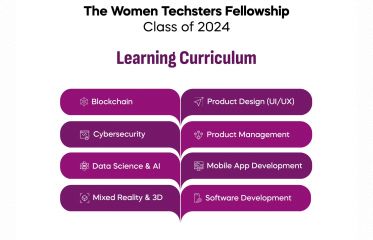 Women Techsters Fellowship Class of 2024 Applications are open
Bridging the digital and technology knowledge divide between men and women
Women Techsters Fellowship Class of 2024 Applications are open
Bridging the digital and technology knowledge divide between men and women
Know more -
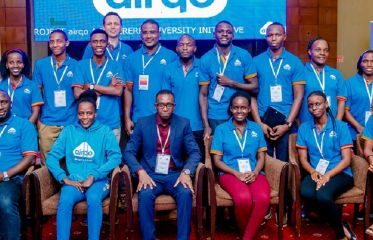 AirQo Internship Program
The internship programme provides an opportunity to work on and contribute to real world projects
AirQo Internship Program
The internship programme provides an opportunity to work on and contribute to real world projects
Know more -
 I4G Cybersecurity Scholarships for young African Youths
8 weeks training program
I4G Cybersecurity Scholarships for young African Youths
8 weeks training program
Know more -
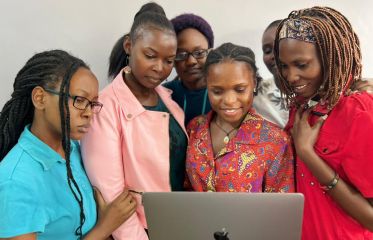 Apply to Women Institute of Technology and Innovation for Diploma in Computer Science for 2023 Intake (Fully Funded)
Advance your IT Career with quality training from WITI
Apply to Women Institute of Technology and Innovation for Diploma in Computer Science for 2023 Intake (Fully Funded)
Advance your IT Career with quality training from WITI
Know more -
Full Scholarship to study Software Engineering at Uganda Technology and Management University 2023-2024 Academic Year Study Software Engineering at a leading University in Uganda
Know more -
MTN Uganda Work readiness program 2023 The initiative provides a three-month soft skills training and internship placement for fresh graduates.
Know more -
MTN Ace Skilling program for young Ugandans The program will focus on skills that will drive co-creation of innovative digital products and solutions to solve Uganda’s biggest problems in Education, Youth Empowerment, Health and Agriculture
Know more -
MTN Ace Tech Innovation Program for young Ugandans The program trains both entry level and experienced digital innovators that are looking to upskill both their programming and entrepreneurial skills
Know more -
 Apply to Polygon Bootcamp Africa and Kickstart Your Web3 Developer Journey
The eight-week intensive educational course and hackathon combo will put developers in Africa on the Web3 map.
Apply to Polygon Bootcamp Africa and Kickstart Your Web3 Developer Journey
The eight-week intensive educational course and hackathon combo will put developers in Africa on the Web3 map.
Know more -
Huawei ICT Competition is back for University Students The 7th Annual Huawei ICT Skills Competition
Know more -
MTN SAS DATA Science Scholarship Full Scholarship to hon your skills as a data scientist
Know more -
EcoBank Fintech Challenge 2022 for Programmers and Developers in Africa (Win up to 50,000 USDs) EcoBank Fintech Challenge is calling on developers and innovators with bright ideas for financial technology to share their vision of creating Africa’s next big fintech solution with them
Know more -
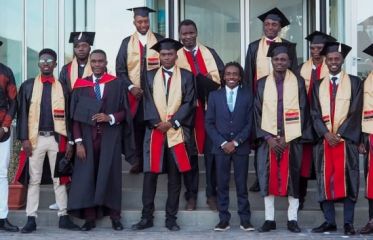 Ministry of Education Algerian Government Scholarships for Academic Year 2022-2023
Full Scholarship to study in Algeria
Ministry of Education Algerian Government Scholarships for Academic Year 2022-2023
Full Scholarship to study in Algeria
Know more -
Google Africa Developer Scholarship 2022 Take your skills to the next level
Know more -
 ALX-Udacity Technology Scholarships for Young Africans (Fully Funded)
Transform your Career in Tech Today
ALX-Udacity Technology Scholarships for Young Africans (Fully Funded)
Transform your Career in Tech Today
Know more -
THE MULJIBHAI MADHVANI FOUNDATION Scholarship Programme 2022 Harness Your Potential
Know more -
 The 2022 NSSF CAREER EXPO for University Students and Fresh Graduates
Join us for the hybrid Career Expo to connect with industry game changers and explore the future of work
The 2022 NSSF CAREER EXPO for University Students and Fresh Graduates
Join us for the hybrid Career Expo to connect with industry game changers and explore the future of work
Know more -
Udacity Microsoft Cloud & Data Scholarship 2022 (Fully Funded) Udacity and Microsoft have teamed up to offer 150 fully-funded scholarships to achieve two big goals
Know more -
 Digital Innovations for Business Resilience in East Africa 2022 Competition
Transfer your digital innovation from University to the Markey
Digital Innovations for Business Resilience in East Africa 2022 Competition
Transfer your digital innovation from University to the Markey
Know more -
 Cisco Global Problem Solver Challenge 2022 for early-stage Entrepreneurs ($1,000,000 USD in prize money)
Cisco seeks to inspire and empower a generation of global problem solver
Cisco Global Problem Solver Challenge 2022 for early-stage Entrepreneurs ($1,000,000 USD in prize money)
Cisco seeks to inspire and empower a generation of global problem solver
Know more -
 Apple Entrepreneur Camp 2022 for Black Founders and Software Developers World Wide
Apple Entrepreneur Camp consists of an immersive technology lab, as well as guidance, education, and support
Apple Entrepreneur Camp 2022 for Black Founders and Software Developers World Wide
Apple Entrepreneur Camp consists of an immersive technology lab, as well as guidance, education, and support
Know more -
African App Launchpad AAL Cup 2021 ($72,000 in Prizes) Competition for African Startups on App and Game Development
Know more -
 Google Conference Scholarships 2021-2022 for selected conferences in computer science and related fields
Google will provide selected recipients up to 3000 USD towards travel and lodging cost
Google Conference Scholarships 2021-2022 for selected conferences in computer science and related fields
Google will provide selected recipients up to 3000 USD towards travel and lodging cost
Know more -
 Africa Internet of Things (IOT) and Artificial Intelligence (AI) Challenge 2021
Africa IoT & AI Challenge is a regional capacity-building and pre-incubation program for Senior University Students and Startups
Africa Internet of Things (IOT) and Artificial Intelligence (AI) Challenge 2021
Africa IoT & AI Challenge is a regional capacity-building and pre-incubation program for Senior University Students and Startups
Know more -
 Apply to Women Institute of Technology and Innovation for 2022 Intake (Fully Funded)
Advance your IT Career with quality training from WITI
Apply to Women Institute of Technology and Innovation for 2022 Intake (Fully Funded)
Advance your IT Career with quality training from WITI
Know more -
 IBM Code Global Challenge 2021 for Computer Programmers World Wide ($200,000 Prize)
Call for Code to Solve World Problems
IBM Code Global Challenge 2021 for Computer Programmers World Wide ($200,000 Prize)
Call for Code to Solve World Problems
Know more -
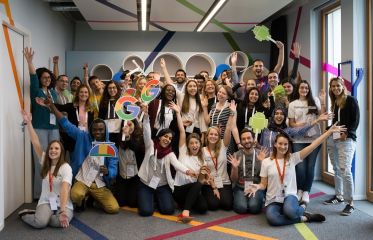 Google Inside Look Program 2021 for Computer Science Students
Gain an Inside Look into Software Engineering at Google
Google Inside Look Program 2021 for Computer Science Students
Gain an Inside Look into Software Engineering at Google
Know more -
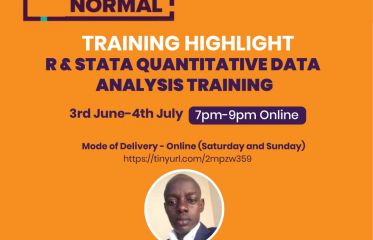 R & Stata Quantitative Data Analysis Online Training
Hon your skills in Data Science
R & Stata Quantitative Data Analysis Online Training
Hon your skills in Data Science
Know more -
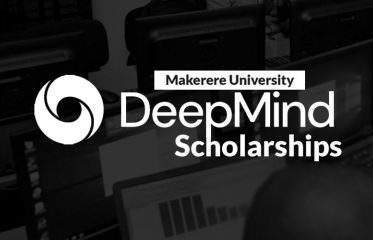 DeepMind Scholarships at Makerere University for a Masters in Computer Science (AI , DataScience)
AI,DataScience Tracks
DeepMind Scholarships at Makerere University for a Masters in Computer Science (AI , DataScience)
AI,DataScience Tracks
Know more -
 Google for Startups Accelerator Africa Program for African Start Ups
Google for Startups Accelerator Africa is a three-month accelerator program for Seed to Series A technology startups across the African continent
Google for Startups Accelerator Africa Program for African Start Ups
Google for Startups Accelerator Africa is a three-month accelerator program for Seed to Series A technology startups across the African continent
Know more -
 Become a job ready software engineer in 3 months with the Refactory Catalyst Program
From zero to job-ready in 3 months
Become a job ready software engineer in 3 months with the Refactory Catalyst Program
From zero to job-ready in 3 months
Know more -
 Schaffhausen Institute of Technology (SIT) STAR Contest 2021
Win a prestigious Masters Scholarship
Schaffhausen Institute of Technology (SIT) STAR Contest 2021
Win a prestigious Masters Scholarship
Know more -
 Join the Uganda Tech Engineers Challenge and win a fully paid exchange trip to Japan
Register for a chance to win a fully paid exchange trip to Japan to visit Japanese ICT Engineering Companies and Institutes
Join the Uganda Tech Engineers Challenge and win a fully paid exchange trip to Japan
Register for a chance to win a fully paid exchange trip to Japan to visit Japanese ICT Engineering Companies and Institutes
Know more -
 Waaw Foundation 2020-2021 STEM Scholarship for African Female Students
Scholarship for Needy STEM Female Students
Waaw Foundation 2020-2021 STEM Scholarship for African Female Students
Scholarship for Needy STEM Female Students
Know more -
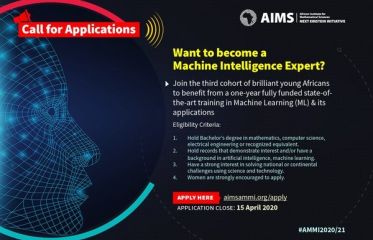 African Masters for Machine Intelligence at African Institute for Mathematical Sciences (Funded)
World Class Education for Machine Learning Researchers
African Masters for Machine Intelligence at African Institute for Mathematical Sciences (Funded)
World Class Education for Machine Learning Researchers
Know more -
 Pan African University Call for Applications for study programs at the Virtual University
Acquire world class Education from Africa's Virtual University
Pan African University Call for Applications for study programs at the Virtual University
Acquire world class Education from Africa's Virtual University
Know more -
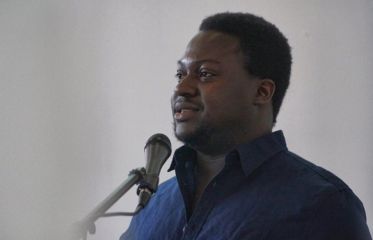 Meet Ham Serunjogi, a Ugandan who left Facebook job to start a company now worth billions
The brain behind the free cross border mobile money payments in Africa
Meet Ham Serunjogi, a Ugandan who left Facebook job to start a company now worth billions
The brain behind the free cross border mobile money payments in Africa
Know more -
 Using Smartphones to Fight Africa’s Second Greatest Killer
African solutions to African problems
Using Smartphones to Fight Africa’s Second Greatest Killer
African solutions to African problems
Know more -
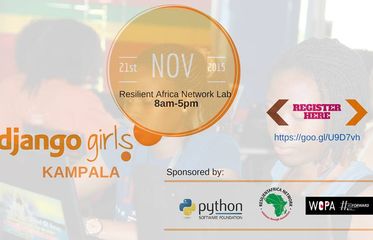 Django Girls are back
Inspiring ladies in web programming
Django Girls are back
Inspiring ladies in web programming
Know more -
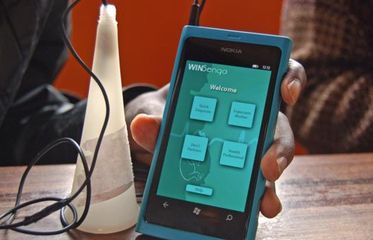 Students develop ultrasound Alternative
Winsenga:A low cost smart phone based ultra sound
Students develop ultrasound Alternative
Winsenga:A low cost smart phone based ultra sound
Know more
Draw Inspiration from time tested individuals
-
 Meet Betty Mirembe, the First President of the Machine Learning Club at Makerere University
Meet Betty Mirembe, the First President of the Machine Learning Club at Makerere University
Watch Interview -
 Catching up with Ramadan Kisambira, the Operations and Maintenace Field Engineer at Africell Uganda
Catching up with Ramadan Kisambira, the Operations and Maintenace Field Engineer at Africell Uganda
Watch Interview
Careers that are in the same career field as Telecommunications Engineering Specialist
-
 Business Intelligence Analyst
Know more
Business Intelligence Analyst
Know more -
 Computer and Information Research Scientist
Know more
Computer and Information Research Scientist
Know more -
 Computer Network Architect
Know more
Computer Network Architect
Know more -
 Computer Network Support Specialist
Know more
Computer Network Support Specialist
Know more -
 Computer Programmer
Know more
Computer Programmer
Know more -
 Computer Systems Analyst
Know more
Computer Systems Analyst
Know more -
Computer Systems Engineer Know more
-
 Database Administrator
Know more
Database Administrator
Know more -
 Geographic Information Systems Technician
Know more
Geographic Information Systems Technician
Know more -
 Geospatial Information Scientists and Technologist
Know more
Geospatial Information Scientists and Technologist
Know more -
 Information Security Analyst
Know more
Information Security Analyst
Know more -
 Information Technology Project Manager
Know more
Information Technology Project Manager
Know more -
 Network and Computer Systems Administrator
Know more
Network and Computer Systems Administrator
Know more -
 Software Developer
Know more
Software Developer
Know more -
 Software Quality Assurance Engineers and Tester
Know more
Software Quality Assurance Engineers and Tester
Know more -
 Telecommunications Engineering Specialist
Know more
Telecommunications Engineering Specialist
Know more -
 Video Game Designer
Know more
Video Game Designer
Know more -
 Web Administrator
Know more
Web Administrator
Know more -
 Web Developer
Know more
Web Developer
Know more -
 BPO executive
Know more
BPO executive
Know more -
 IT infrastructure engineer
Know more
IT infrastructure engineer
Know more -
 Application engineer
Know more
Application engineer
Know more -
 Support engineer
Know more
Support engineer
Know more -
 Database Architect
Know more
Database Architect
Know more -
 Computer Systems Analyst
Know more
Computer Systems Analyst
Know more -
 Informatics Nurse Specialists
Know more
Informatics Nurse Specialists
Know more -
 Software Developer, Applications
Know more
Software Developer, Applications
Know more -
 Software Developer, Systems Software
Know more
Software Developer, Systems Software
Know more -
 Database Administrators
Know more
Database Administrators
Know more -
 Network and Computer Systems Administrators
Know more
Network and Computer Systems Administrators
Know more -
 Computer Network Architects
Know more
Computer Network Architects
Know more -
 Telecommunications Engineering Specialist
Know more
Telecommunications Engineering Specialist
Know more -
 Computer User Support Specialist
Know more
Computer User Support Specialist
Know more -
 Computer Network Support Specialist
Know more
Computer Network Support Specialist
Know more -
 Software Quality Assurance Engineer and Tester
Know more
Software Quality Assurance Engineer and Tester
Know more -
 Computer Systems Engineer/Architect
Know more
Computer Systems Engineer/Architect
Know more -
 Web Administrator
Know more
Web Administrator
Know more -
 Geospatial Information Scientists and Technologist
Know more
Geospatial Information Scientists and Technologist
Know more -
 Geographic Information Systems Technician
Know more
Geographic Information Systems Technician
Know more -
 Database Architect
Know more
Database Architect
Know more -
 Data Warehousing Specialist
Know more
Data Warehousing Specialist
Know more -
 Information Technology Project Manager
Know more
Information Technology Project Manager
Know more -
 Search Marketing Strategist
Know more
Search Marketing Strategist
Know more -
 Document Management Specialist
Know more
Document Management Specialist
Know more -
 Information Security Engineer
Know more
Information Security Engineer
Know more -
Blockchain Engineer Know more
Online Training in Information Technology
Trending Opportunities
Latest Jobs Corner
-
UN Jobs – Social Service Workforce Consultant – United Nations Children’s Fund (UNICEF)
Posted: Posted Fri, 19 Dec 2025 09:08:03 +0000 -
Accounts Officer Jobs – Africa Safari Trips
Posted: Posted Fri, 19 Dec 2025 09:06:54 +0000 -
GIS & Data Officer Jobs – ACTED Uganda
Posted: Posted Fri, 19 Dec 2025 09:05:35 +0000 -
Underwriter Jobs – Mayfair Insurance
Posted: Posted Fri, 19 Dec 2025 09:04:22 +0000 -
Fresher Accountant Jobs – Nzuri Furniture
Posted: Posted Fri, 19 Dec 2025 09:03:12 +0000 -
Human Resources Manager Jobs – Africa Global Logistics
Posted: Posted Fri, 19 Dec 2025 09:02:00 +0000 -
Sales Agronomist Jobs – Ecolite Minerals Uganda
Posted: Posted Fri, 19 Dec 2025 09:00:42 +0000 -
Electrician Jobs – Kenchic Uganda
Posted: Posted Fri, 19 Dec 2025 08:59:22 +0000 -
Sales Manager Jobs – Kenchic Uganda
Posted: Posted Fri, 19 Dec 2025 08:58:10 +0000 -
Hospital Ambulance Driver Jobs – C-Care Uganda
Posted: Posted Fri, 19 Dec 2025 08:56:59 +0000
Advertisement
Trending Opportunities
Advertisement
Popular Careers
-
Civil Engineer
30325 Views -
Actor
24492 Views -
Flight attendant
22462 Views -
Fashion Designer
20708 Views -
Pilot and flight engineer
19391 Views












